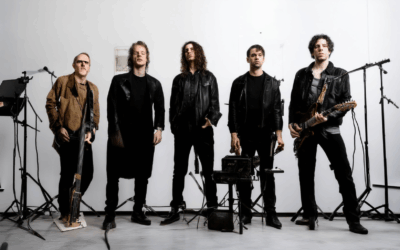Podcasting has emerged as a powerful medium for sharing stories, music, and ideas, offering creators a unique platform to connect with audiences worldwide. If you’ve ever pondered the idea of starting a music podcast, you’re likely drawn by the allure of crafting meaningful content, exploring your creative side, and building a loyal listener base. Whether you’re a seasoned musician or a podcast newcomer, the journey into audio storytelling presents a world of possibilities, from experimenting with sound design to mastering the art of engaging your audience. This guide will walk you through the essential steps, costs, and considerations to help you navigate the process of starting your own music podcast, ensuring you’re well-prepared to create compelling content that resonates with your listeners.
Key Takeaways
- Define Your Theme and Niche: Choose a theme that aligns with your passions and a niche that resonates with your audience for a focused and impactful podcast.
- Align with Your Passions and Expertise: Reflect your personality and skills to create authentic and engaging content.
- Research Your Audience: Understand demographics and preferences to tailor your content effectively.
- Explore Subgenres and Unique Angles: Add depth and originality to your podcast offerings.
- Reflect Your Branding Authentically: Maintain visual and auditory consistency to build trust and loyalty.
- Balance Specificity with Breadth: Attract a wider audience while keeping your focus sharp.
- Stay Consistent and Evolve: Keep your theme steady while adapting to industry trends.
- Consider Monetization Strategies: Choose a monetization model that fits your niche for sustainable growth.
- Choose the Right Hosting Platform: Select platforms like Anchor, Libsyn, or Spotify for optimal reach.
- Invest in Quality Audio Equipment: Enhance your podcast’s sound quality for a better listener experience.
- Focus on Niche Markets: Specialize to boost engagement and attract sponsors.
- Build a Strong Online Presence: Utilize social media and websites for effective promotion.
- Maintain Consistency in Publishing: Regular episodes help build and retain your audience.
- Engage with Your Audience: Foster loyalty through interactive elements and community-building efforts.

How to Start a Music Podcast
Starting a music podcast involves several key steps to ensure your show stands out and resonates with your target audience. Below is a detailed guide to help you get started:
- Choose Your Concept and Niche
- Develop Your Podcast Name
- Set Up Your Equipment
Decide on a unique angle or theme for your podcast. Whether it’s a genre-specific discussion, artist interviews, or album reviews, define what sets your podcast apart. Consider your passion, expertise, and the demand for content in your chosen niche.
Brainstorm a catchy and relevant name that reflects your podcast’s theme. Ensure it’s easy to remember and spell. Once finalized, register your podcast name as a trademark to protect your brand.
Invest in quality audio equipment to ensure your podcast sounds professional. Key essentials include:
- A good microphone (e.g., Blue Yeti or Shure SM58)
- Headphones or earbuds for monitoring
- A pop filter to reduce background noise
- Audio editing software (e.g., Audacity or Adobe Audio Editor)
Choose a reliable hosting service to distribute your podcast. Popular platforms include:
- Apple Podcasts
- Spotify
- Libsyn
Outline your podcast series in advance. Plan seasonal themes, recurring segments, or guest appearances. Consistency is key to building and retaining an audience.
Prepare a script or talking points before recording. Record high-quality audio in a quiet environment. Edit your recordings to remove errors and enhance sound quality using your chosen editing software.
Create visually appealing artwork that aligns with your brand. Write detailed show notes for each episode, including timestamps, key points, and links to resources or music discussed.
Share your podcast on social media platforms like Instagram, Twitter, and Facebook. Engage with your audience by responding to comments and messages. Collaborate with influencers or other podcasts to expand your reach.
Submit your podcast to major directories like iTunes and Google Play. Use SEO tools to optimize your podcast metadata for better visibility in search results. Consider submitting to specialized directories catering to music enthusiasts.
Consistently release new episodes to keep your audience engaged. Encourage listeners to subscribe, leave reviews, and share your podcast with friends. Build a community by interacting with your audience on social media and email newsletters.
Once you’ve built a loyal audience, explore monetization strategies like:
- Patreon : Support from fans who appreciate your content
- Crowdfunding Campaigns : Raise funds for specific projects
- Sponsored Content : Partner with brands or services relevant to your audience
- Affiliate Marketing : Earn commissions by promoting products
Regularly analyze your podcast performance using analytics tools. Listen to your episodes and seek feedback from your audience. Continuously improve your content, production quality, and promotional strategies to grow your podcast.
How Much Does It Cost to Start a Music Podcast?
Starting a music podcast involves several costs, ranging from initial setup to ongoing expenses. Here’s a breakdown:
- Hosting Costs :
- Monthly fees for hosting on platforms like Apple Podcasts , Spotify , or Anchor FM . These typically range between $20 to $50 per month, depending on features like advanced analytics.
- Equipment Investment :
- A decent smartphone with a good microphone can cost around $100-$300.
- Higher-quality microphones or mixers may cost up to $500 or more.
- Headphones are essential, costing approximately $100 to $200.
- Distribution and Submission Fees :
- Submitting your podcast to directories like Apple Podcasts or Spotify may incur a one-time fee of $99 per platform.
- Monetization Strategies :
- Joining ad networks like Google Podcasts or AdMob incurs a revenue share, typically 15-30%.
- Setting up a Patreon or similar platform for premium content has monthly fees of $10-$30.
- Promotion and Marketing :
- Social media marketing, influencer collaborations, and ad campaigns can range from $100 to several thousand dollars, depending on reach and strategy.
- Legal Considerations :
- Registering as a business entity may cost $50 to $100 in some jurisdictions.
- Obtaining necessary licenses for music and sound effects can add around $100.
Conclusion : Starting a music podcast requires an initial investment of a few hundred dollars, with ongoing monthly expenses ranging from $50 to several hundred, depending on goals and scale. With careful planning and resource management, it’s achievable even on a budget.

How to Choose the Right Theme and Niche for Your Music Podcast
Your podcast theme and niche are critical to attracting and retaining listeners. Here’s a structured approach to selecting the perfect combination:
1. Define Your Passion and Interests
- Identify Your Genre : Start by narrowing down your favorite music genres. Consider rock, jazz, classical, or electronic, among others.
- Blend Subgenres Thoughtfully : Mix subgenres to create a unique sound. For example, combining indie folk with lo-fi can offer a fresh take.
- Unique Angles : Offer something distinct, like artist interviews, album deep dives, or historical music exploration.
2. Identify Your Target Audience
- Understand Demographics : Research age, gender, location, and income levels of potential listeners.
- Niche Identification : Decide if your podcast is for casual listeners, hardcore fans, or specific demographics like working professionals or students.
- Competitor Analysis : Study popular podcasts in your chosen niche to understand gaps you can fill.
3. Align with Branding and Style
- Reflect Your Personality : Ensure your theme mirrors your personal style—whether it’s energetic, reflective, or humorous.
- Visual Consistency : Use consistent visuals, colors, and imagery that resonate with your theme.
- Authenticity : Authentic branding builds trust and loyalty among listeners.
4. Stay Consistent and Evolve
- Maintain Consistency : Keep your theme and niche consistent to avoid confusing your audience.
- Adaptation : Stay flexible to evolve with industry trends while preserving your core identity.
5. Monetization Considerations
- Revenue Streams : Explore options like sponsorships, ads, and affiliate marketing based on your niche.
- Sponsorship Deals : Target sponsors aligned with your audience for better engagement and revenue.
6. Technical Setup and Distribution
- Choose the Right Platform : Upload your podcast to platforms like Apple Podcasts, Spotify, or YouTube for broader reach.
- Optimize SEO : Use relevant titles, descriptions, and tags to enhance visibility in search results.
7. Build Engagement and Feedback
- Interact with Listeners : Engage through social media, email newsletters, and community forums.
- Listener Feedback : Regularly gather opinions to refine your content and improve listener experience.
By following these steps, you can craft a podcast that resonates with your audience, stands out in the market, and achieves your goals.

How to Choose the Right Theme and Niche for Your Music Podcast
Your podcast theme and niche are critical to attracting and retaining listeners. Here’s a structured approach to selecting the perfect combination:
1. Define Your Passion and Interests
- Identify Your Genre : Start by narrowing down your favorite music genres. Consider rock, jazz, classical, or electronic, among others.
- Blend Subgenres Thoughtfully : Mix subgenres to create a unique sound. For example, combining indie folk with lo-fi can offer a fresh take.
- Unique Angles : Offer something distinct, like artist interviews, album deep dives, or historical music exploration.
2. Identify Your Target Audience
- Understand Demographics : Research age, gender, location, and income levels of potential listeners.
- Niche Identification : Decide if your podcast is for casual listeners, hardcore fans, or specific demographics like working professionals or students.
- Competitor Analysis : Study popular podcasts in your chosen niche to understand gaps you can fill.
3. Align with Branding and Style
- Reflect Your Personality : Ensure your theme mirrors your personal style—whether it’s energetic, reflective, or humorous.
- Visual Consistency : Use consistent visuals, colors, and imagery that resonate with your theme.
- Authenticity : Authentic branding builds trust and loyalty among listeners.
4. Stay Consistent and Evolve
- Maintain Consistency : Keep your theme and niche consistent to avoid confusing your audience.
- Adaptation : Stay flexible to evolve with industry trends while preserving your core identity.
5. Monetization Considerations
- Revenue Streams : Explore options like sponsorships, ads, and affiliate marketing based on your niche.
- Sponsorship Deals : Target sponsors aligned with your audience for better engagement and revenue.
6. Technical Setup and Distribution
- Choose the Right Platform : Upload your podcast to platforms like Apple Podcasts, Spotify, or YouTube for broader reach.
- Optimize SEO : Use relevant titles, descriptions, and tags to enhance visibility in search results.
7. Build Engagement and Feedback
- Interact with Listeners : Engage through social media, email newsletters, and community forums.
- Listener Feedback : Regularly gather opinions to refine your content and improve listener experience.
By following these steps, you can craft a podcast that resonates with your audience, stands out in the market, and achieves your goals.
Costs and Platforms for Starting a Music Podcast
Launching a music podcast involves several considerations, including costs, platform selection, and strategic planning. Here’s a breakdown of the key factors to help you get started:
Costs Involved
- Hosting Services: The majority of podcast hosting platforms charge monthly fees. Popular options include Anchor (free tier available), Libsyn , and Patreon . Pricing typically ranges from $5 to $50 per month.
- Equipment: Initial investments may include a decent microphone ($100-$500), an audio interface ($50-$200), and recording software like Audacity (free or paid versions).
- Domain and Website: If you plan to create a dedicated website, expect to pay for domain registration ($10-$30/year) and hosting ($15-$100/month).
- Promotion and Marketing: Budget for podcast promotion through social media ads, guest appearances, or collaborations. Average costs can range from $100 to $500+ depending on reach and strategy.
Popular Platforms for Podcast Hosting
- Anchor: Known for its user-friendly interface and free tier, Anchor supports monetization through sponsorships and donations. Learn more .
- Libsyn: Offers advanced analytics and monetization options, ideal for established podcasts. Explore Libsyn .
- Patreon: Great for building a loyal audience and earning via memberships. Get started .
- iTunes/Apple Podcasts: While primarily a distribution platform, it’s essential for reaching iOS users. Access Apple Podcasts .
- Spotify: A growing platform for podcast distribution, particularly among younger audiences. Explore Spotify Podcasts .
Choosing the Right Platform
Each platform has unique features, such as monetization options, listener analytics, and distribution channels. For example, Oedipus Band leverages Anchor for their music podcast, combining cost-effectiveness with audience engagement tools.
Additional Tips for Success
- Niche Focus: Specialize in a genre or theme to attract dedicated listeners. For instance, music-focused podcasts like “The Soundtrack” or “Rock & Roll History” often perform well.
- Content Quality: Invest in high-quality audio production and engaging storytelling to retain listeners. Tools like Audacity can help polish your recordings.
- Consistency: Regularly release episodes to build and maintain an audience. Many successful podcasts post weekly or bi-weekly episodes.
- Engagement Strategies: Encourage listener interaction through polls, Q&A sessions, or shoutouts. Platforms like Discord can help foster community building.
Conclusion
Starting a music podcast is a rewarding venture that requires careful planning and execution. By considering the costs, selecting the right platform, and focusing on quality content, you can create a podcast that resonates with your audience and achieves your goals. Whether you’re sharing music reviews, interviews, or curated playlists, the possibilities are endless. Get started today and join the vibrant world of podcasting!

How to Choose the Right Theme and Niche for Your Music Podcast
Choosing the right theme and niche for your music podcast involves aligning your content with your passions, target audience, and long-term goals. Here’s a step-by-step guide to help you make informed decisions:
- Define Your Theme and Niche: – Theme: Decide on the overall vibe of your podcast. Is it energetic, reflective, humorous, or educational? For example, a lighthearted theme might involve funny anecdotes about music history, while a serious theme could focus on in-depth album analyses. – Niche: Identify your target audience. Are you catering to rock enthusiasts, jazz lovers, or classical music fans? Narrow it down further by considering subgenres like indie rock, metal, or electronic music.
- Align with Your Passions and Expertise: – Your podcast should reflect what you’re most enthusiastic about. If you’re passionate about a specific genre, focus on that to maintain engagement and credibility. Explore unique angles like artist interviews, music history, or genre evolution.
- Research Your Audience: – Understand the preferences of your target listeners. Are they die-hard fans of a particular artist or band, or are they interested in discovering new talents? Tailor your content to meet their needs and preferences.
- Explore Subgenres and Unique Angles: – Dive into related subgenres to find untapped opportunities. For instance, if you focus on rock music, consider blending it with pop or folk elements to create a distinct sound. Offer unique perspectives, such as live performances, acoustic covers, or behind-the-scenes stories.
- Reflect Your Branding Authentically: – Ensure your theme aligns with your podcast’s branding. Consistency in visuals, tone, and content will help establish trust and recognition among your listeners. Authenticity builds loyalty and attracts like-minded individuals.
- Balance Specificity with Breadth: – Choose a niche that’s specific enough to stand out but broad enough to attract a wider audience. For example, instead of limiting yourself to just rock music, you could focus on “Rock ‘n’ Roll Stories” to appeal to a broader audience interested in music history.
- Technical Preparation: – Invest in quality recording and editing tools to ensure your podcast sounds professional. High-quality audio enhances the listening experience and reinforces your theme of excellence.
- Stay Consistent and Evolve Over Time: – Maintain consistency in your theme and niche to retain your audience. However, remain flexible to adapt based on feedback and industry trends. Regularly refresh your content to keep it engaging without straying from your core theme.
- Consider Monetization Strategies: – Think about how your theme and niche position you for monetization opportunities. Popular niches may attract sponsors or ad revenue, but ensure your choices align with your long-term vision and passion.
- Analyze Competition and Differentiate Yourself: – Research existing podcasts in your chosen niche. Identify gaps or unique angles you can exploit. Collaborate with influencers or bloggers in related fields to gain exposure and establish your podcast as a go-to resource.
By following these steps, you’ll not only select a theme and niche that resonate with you but also create a podcast that captivates and grows your audience. Remember, consistency, authenticity, and a clear focus will be key to your success.



0 Comments